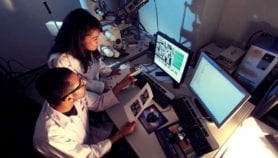Send to a friend
The details you provide on this page will not be used to send unsolicited email, and will not be sold to a 3rd party. See privacy policy.
The hacked emails of climate researchers offer an opportunity to show how science is really done — instead of a rearguard defence of scientific ‘objectivity’.
Historians of science have long known that Gregor Mendel, the 19th century Augustinian monk who discovered how genetic traits are inherited, ‘fudged’ some of his data. His experimental methods were not as rigorous as they should have been and he failed to publish results of experiments that did not turn out as expected.
Such revelations show that science is less exact than many people would like to believe. But they do not invalidate Mendel’s insights, which have become the cornerstone of modern genetics.
The same could be said of the ‘Climategate’ row that erupted last month after emails were hacked from the Climatic Research Unit at the University of East Anglia, in England. The emails suggest that some university researchers may have selected favourable data in their publications to boost arguments about the severity of climate change and its origins in human activity.
Scientists attached to the Intergovernmental Panel on Climate Change (IPCC), the body charged with assessing the current state of science on global warming, have been quick to declare that the emails do not undermine the broad consensus on the significance of climate change. Nor do they invalidate calls for urgent action.
But such responses have, so far, made little impact on those determined to oppose calls for international action and lifestyle changes to tackle global warming.
There is a strong case now for reassessing how science is presented to the public and policymakers to counter the opposition. And there is no more important field for doing so than climate change as world leaders grapple with the issues at the UN Framework Convention on Climate Change in Copenhagen, Denmark this week.
On the defensive in Copenhagen
Unsurprisingly, Climategate is a hot topic — both privately and publicly — at the convention.
IPCC chair Rajendra Pachauri, for example, emphasised that the broad results published by the East Anglia scientists have been confirmed by tens of thousands of independent climate researchers across the globe. Whatever ‘unscientific’ views or strategies are discussed in the emails, the resulting papers were rigorously peer reviewed before publication, he stressed.
But Mohammad Al-Sabban, the main negotiator in Copenhagen for Saudi Arabia — a country keen to maintain high oil consumption and long opposed to strong action against climate change — claimed the emails made it clear that "there is no relationship whatsoever between human activities and climate change".
This type of reaction has put the IPCC on the defensive, with its officials condemning publication of the emails as an illegal act intended to discredit the panel’s work.
The human face of science
The alleged motivation is credible. It is no coincidence that the emails were released shortly before the Copenhagen meeting. Those responsible must be delighted with the extent to which Climategate has boosted opposition to any agreement on firm action.
But dismissing the emails on the grounds that they were obtained illegally misses the important point that they show science to be a more human process than is usually portrayed.
The emails reveal that the scientists who wrote them were frustrated by the attacks of critics and, like Mendel, were anxious to sharpen the strength of their conclusions. Few would challenge the idea that many scientists feel keen to highlight their findings; the researchers’ crime seems to have been to express them in print.
However, if researchers are to be more transparent and avoid accusations of tampering with data as being unscientific, the public must also accept how science is actually practised — a point highlighted by researchers Mike Hulme and Jerome Ravetz in a recent BBC commentary.
To achieve this, scientists must do more to present a human face when explaining their processes and practices instead of hiding behind the claim that science is entirely objective.
Turning attacks into opportunities
Climategate is teaching the IPCC this lesson the hard way. By relying excessively on the apparent objectivity of its research assessments to give the panel its authority, it has made itself and its conclusions politically vulnerable. Now any criticism that challenges the objectivity of research used by the IPCC, however minor, undermines the panel’s reputation.
For example, the report that Indian glaciers may not be disappearing as rapidly as the IPCC has predicted has also given sceptics scope to inflict damage.
The IPCC, to its credit, tries hard to be transparent in its own handling of scientific evidence by making good use of communication channels. For instance, it logged and replied online to each of the estimated 300,000 comments received on its latest assessment report, published in 2007.
The media, too, must improve its understanding and description of science. It often demands a black-and-white picture of scientific evidence, rather than a more nuanced description based on the social nature of scientific inquiry. This undervalues the true robustness of the scientific process and undermines the strength of political decisions based on conclusions emerging from it.
In the short term, Climategate may damage the cause of those seeking quick and robust action on climate change. But if, in the process, it helps make the case for politicians, the public and the media to understand how science actually works, it can only strengthen the solutions the world needs to address climate change.
David Dickson
Director, SciDev.Net













